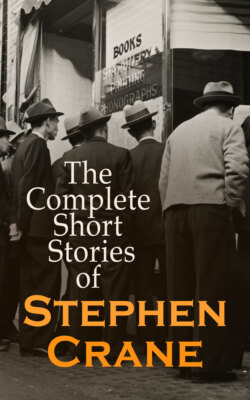Читать книгу The Complete Short Stories of Stephen Crane - Stephen Crane - Страница 63
На сайте Литреса книга снята с продажи.
VI
ОглавлениеPeza, as he ran along the crest of the mountain, believed that his action was receiving the wrathful attention of the hosts of the foe. To him then it was incredible foolhardiness thus to call to himself the stares of thousands of hateful eyes. He was like a lad induced by playmates to commit some indiscretion in a cathedral. He was abashed; perhaps he even blushed as he ran. It seemed to him that the whole solemn ceremony of war had paused during this commission. So he scrambled wildly over the rocks in his haste to end the embarrassing ordeal. When he came among the crowning rifle-pits filled with eager soldiers he wanted to yell with joy. None noticed him save a young officer of infantry, who said—"Sir, what do you want?" It was obvious that people had devoted some attention to their own affairs.
Peza asserted, in Greek, that he wished above everything to battle for the fatherland. The officer nodded; with a smile he pointed to some dead men covered with blankets, from which were thrust upturned dusty shoes.
"Yes, I know, I know," cried Peza. He thought the officer was poetically alluding to the danger.
"No," said the officer at once. "I mean cartridges —a bandolier. Take a bandolier from one of them."
Peza went cautiously toward a body. He moved a hand toward the corner of a blanket. There he hesitated, stuck, as if his arm had turned to plaster. Hearing a rustle behind him he spun quickly. Three soldiers of the close rank in the trench were regarding him. The officer came again and tapped him on the shoulder. "Have you any tobacco?" Peza looked at him in bewilderment. His hand was still extended toward the blanket which covered the dead soldier. "Yes," he said, "I have some tobacco." He gave the officer his pouch. As if in compensation, the other directed a soldier to strip the bandolier from the corpse. Peza, having crossed the long cartridge belt on his breast, felt that the dead man had flung his two arms around him.
A soldier with a polite nod and smile gave Peza a rifle, a relic of another dead man. Thus, he felt, besides the clutch of a corpse about his neck, that the rifle was as inhumanly horrible as a snake that lives in a tomb. He heard at his ear something that was in effect like the voices of those two dead men, their low voices speaking to him of bloody death, mutilation. The bandolier gripped him tighter; he wished to raise his hands to his throat like a man who is choking. The rifle was clammy; upon his palms he felt the movement of the sluggish currents of a serpent's life; it was crawling and frightful.
All about him were these peasants, with their interested countenances, gibbering of the fight. From time to time a soldier cried out in semi-humorous lamentations descriptive of his thirst. One bearded man sat munching a great bit of hard bread. Fat, greasy, squat, he was like an idol made of tallow. Peza felt dimly that there was a distinction between this man and a young student who could write sonnets and play the piano quite well. This old blockhead was coolly gnawing at the bread, while he, Peza, was being throttled by a dead man's arms.
He looked behind him, and saw that a head by some chance had been uncovered from its blanket. Two liquid-like eyes were staring into his face. The head was turned a little sideways as if to get better opportunity for the scrutiny. Peza could feel himself blanch; he was being drawn and drawn by these dead men slowly, firmly down as to some mystic chamber under the earth where they could walk, dreadful figures, swollen and blood-marked. He was bidden; they had commanded him; he was going, going, going.
When the man in the new white helmet bolted for the rear, many of the soldiers in the trench thought that he had been struck, but those who had been nearest to him knew better. Otherwise they would have heard the silken sliding tender noise of the bullet and the thud of its impact. They bawled after him curses, and also outbursts of self-congratulation and vanity. Despite the prominence of the cowardly part, they were enabled to see in this exhibition a fine comment upon their own fortitude. The other soldiers thought that Peza had been wounded somewhere in the neck, because as he ran he was tearing madly at the bandolier, the dead man's arms. The soldier with the bread paused in his eating and cynically remarked upon the speed of the runaway.
An officer's voice was suddenly heard calling out the calculation of the distance to the enemy, the readjustment of the sights. There was a stirring rattle along the line. The men turned their eyes to the front. Other trenches beneath them to the right were already heavily in action. The smoke was lifting toward the blue sky. The soldier with the bread placed it carefully on a bit of paper beside him as he turned to kneel in the trench.
